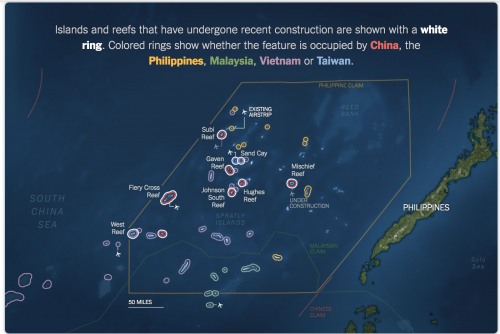Vietnam, Yielding to Beijing, Backs Off South China Sea Drilling

Vietnam, Yielding to Beijing, Backs Off South China Sea Drilling
Dotted with small islands and reefs, the South China Sea (called the East Sea in Vietnam) has been the center of a string of territorial disputes that have involved Brunei, Malaysia, the Philippines, Taiwan and Vietnam. This NYtimes article by Mike Ives focuses on the progression of China-Vietnam disputes over the waters and its islands. In July, Vietnam suspended a gas-drilling project in the South China Sea, in order to avoid escalations in conflict due to the claim China had staked on that particular region of the sea.
A subsidiary of the Spanish energy company Repsol had been hired for the drilling, which had started in June off the southern Vietnamese coast. The drilling area existed on the border of Vietnam’s 200-nautical-mile exclusive economic zone but is challenged by China, which is building artificial islands in the sea for its military.
This artificial island process involves taking sediment from the sea floor and depositing it on top of submerged reefs. These created islands pose a huge threat toward biodiversity and ecological preservation in the areas affected. Though Vietnam, Malaysia, the Philippines and Taiwan have all expanded islands in the Spratlys (the Spratly islands are located more than 500 miles off of mainland China, and are a disputed scattering of reefs and islands in the South China Sea) as well, China’s speed and scale of reef-to-island expansion is unprecedented.
One of the most interesting points presented in this article regarded how Vietnam’s government restricted news and media coverage of the South China Sea tensions with China. Their reasoning was that anti-Chinese sentiment in Vietnam could quickly lead to greater anger and frustration against Vietnam’s government officials for not satisfyingly resolving the territorial disputes.
Alliances are another significant factor. Vietnam is not confident that the Trump administration in the U.S. would give any support to their efforts. The Philippines, though at first seeming like it could be an ideal partner for Vietnam in the disputes, has recently expressed its desire for direct talks with China.
In order to better understand these territorial disputes, I would want to look into China’s motivations for asserting their claim over a greater area of the South China Sea. Why now? I would also want to look more closely into how this recent assertion affects Vietnam.
Comments
Sheiran, this is an exciting project to pick up. One of the key obstacles in the international court rulings for these islets and islands has been the way each country staked their territorial claims. Many resorted to colonial maps created by the former colonial powers like France and English, which pose problems of their own. Still, others argued that the existence of archaeological remnants legitimize their claims to sovereignty over the area. Some of the major questions moving forward with this topic are (1) how are these arguments for sovereignty imbricated in a specific understanding of the nation-state and (2) how are the ideologies mapped onto actual litigation?
Pages